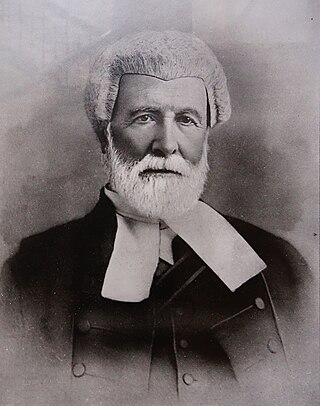Canadian federalism involves the current nature and historical development of the federal system in Canada.

John Foster McCreight, was a jurist and the first premier of British Columbia.

Sparwood is a district municipality in the Canadian province of British Columbia. It is the second-largest community on the Elk River.

The Legislative Assembly of British Columbia is the deliberative assembly of the Parliament of British Columbia, in the province of British Columbia, Canada. The other component of Parliament is the lieutenant governor of British Columbia. The assembly has 87 elected members and meets in Victoria. Members are elected from provincial ridings and are referred to as members of the Legislative Assembly (MLAs). Bills passed by the assembly are given royal assent by the lieutenant governor in the name of the King of Canada.
Canadian securities regulation is managed through the laws and agencies established by Canada's 10 provincial and 3 territorial governments. Each province and territory has a securities commission or equivalent authority with its own provincial or territorial legislation.
The court system of Canada is made up of many courts differing in levels of legal superiority and separated by jurisdiction. In the courts, the judiciary interpret and apply the law of Canada. Some of the courts are federal in nature, while others are provincial or territorial.

The Attorney General of Ontario is the chief legal adviser to His Majesty the King in Right of Ontario and, by extension, the Government of Ontario. The Attorney General is a senior member of the Executive Council of Ontario and oversees the Ministry of the Attorney General – the department responsible for the oversight of the justice system in the province of Ontario. The Attorney General is an elected Member of Provincial Parliament who is appointed by the Lieutenant Governor of Ontario on the constitutional advice of the Premier of Ontario. The Ministry is the largest justice system in Canada and one of the largest in North America.
Henry John Boulton, was a lawyer and political figure in Upper Canada and the Province of Canada, as well as Chief Justice of Newfoundland.
Legal Aid BC is the legal aid provider in British Columbia, Canada.

The attorney general of British Columbia (AG) oversees the Ministry of Attorney General, a provincial government department responsible for the oversight of the justice system, within the province of British Columbia, Canada. The attorney general is a member of the provincial cabinet, typically a member of Legislative Assembly who is chosen by the premier of British Columbia and formally appointed by the lieutenant governor of British Columbia.
Manitoba Justice, or the Department of Justice, is the provincial government department responsible for administering the Crown Law justice systems in the province of Manitoba.
In Canada, the criminal legal system is divided into federal and provincial/territorial jurisdictions. Provincial/territorial correctional facilities hold people who have been sentenced to less than two years in custody and people being held on remand. Federal Correctional Facilities, which are the responsibility of Correctional Service of Canada—is concerned with people who have been sentenced to two years or more in custody.
Because the country contains two major language groups and numerous other linguistic minorities, in Canada official languages policy has always been an important and high-profile area of public policy.
The Canadian Anti-racism Education and Research Society (CAERS) is a Canadian non-profit organization that tracks hate groups and extremism, provides direct support to victims of racism and discrimination, and lobbies government and governmental agencies for the development of effective policy and legislation to stop racism. The social justice law firm Rush, Crane, Guenther, provides legal counsel.

The Accessibility for Ontarians with Disabilities Act, 2005 (AODA) is a statute enacted in 2005 by the Legislative Assembly of Ontario in Canada. Its purpose is to improve accessibility standards for Ontarians with physical and mental disabilities to all public establishments by 2025.
The language policies of Canada's province and territories vary between the provinces and territories of Canada. Although the federal government operates as an officially bilingual institution, providing services in English and French, several provincial governments have also instituted or legislated their own language policies.
The 1st Legislative Assembly of British Columbia sat from 1871 to 1875. The members were elected in the British Columbia general election held in October 1871. John Foster McCreight was called upon to form a cabinet. In December 1872, the government was defeated on a confidence motion and Amor De Cosmos subsequently formed a new cabinet. After De Cosmos was elected to the House of Commons in February 1874, George A. Walken became premier.

Murray Rankin is a Canadian lawyer, politician and public law expert who serves as British Columbia's Minister of Indigenous Relations and Reconciliation. A member of the New Democratic Party, Rankin represents the riding of Oak Bay-Gordon Head in the Legislative Assembly of British Columbia. Rankin previously served as the federal Member of Parliament for Victoria from 2012 to 2019, with senior roles including Justice and Attorney General Critic, Health Critic, and NDP House Leader. From 2019 to 2020, Rankin was head of Canada's National Security and Intelligence Review Agency (NSIRA), overseeing all national security and intelligence activities carried out by the Government of Canada. Previously, he was a professor of law at the University of Victoria, where he taught environmental and administrative law.
The Office of the British Columbia Ombudsperson is one of ten provincial ombudsman offices in Canada. It receives enquiries and complaints about the administrative practices and services of public agencies in British Columbia. It is headed by the B.C. Ombudsperson, an officer of the provincial legislature who is independent of government and political parties. Its role is to impartially investigate complaints to determine whether public agencies have acted fairly and reasonably, and whether their actions and decisions were consistent with relevant legislation, policies and procedures.

Niki Sharma is a Canadian politician and lawyer, who was elected to the Legislative Assembly of British Columbia in the 2020 British Columbia general election. She represents the electoral district of Vancouver-Hastings as a member of the British Columbia New Democratic Party and serves as Attorney General of British Columbia.






